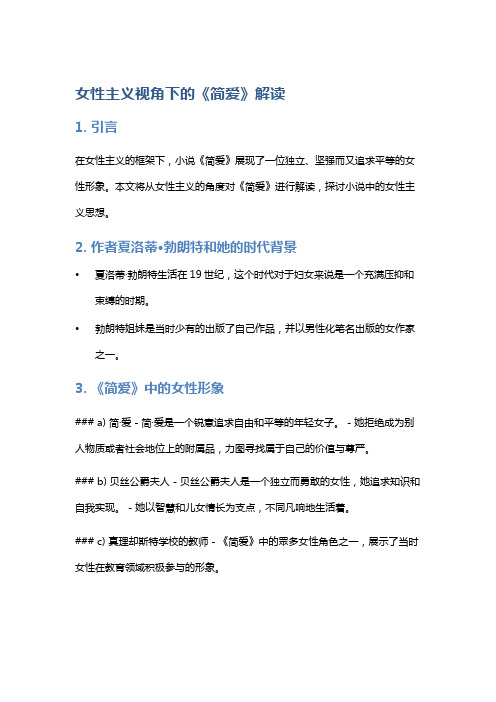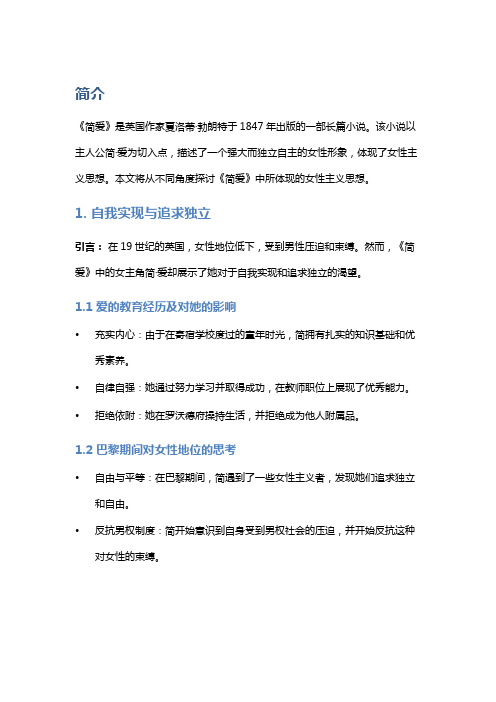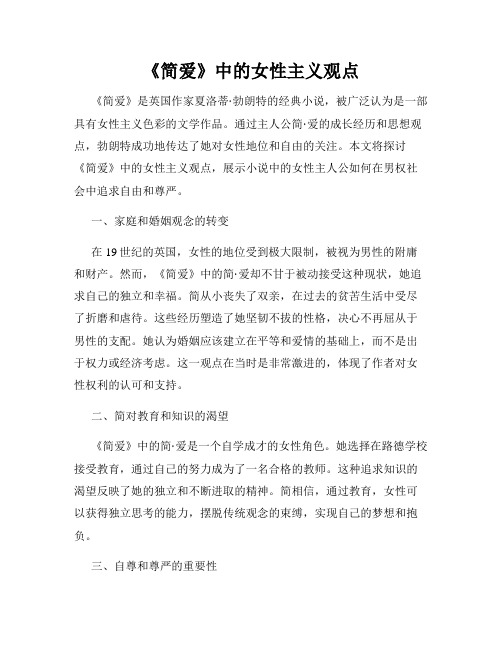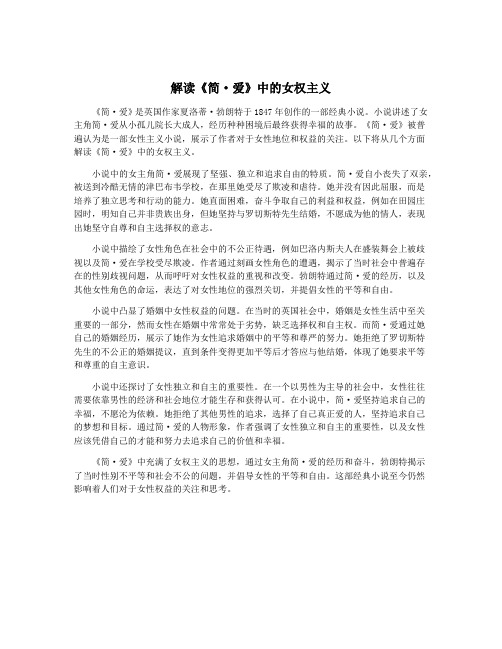简爱中的女性主义
《女性主义视角下的《简爱》解读》

女性主义视角下的《简爱》解读1. 引言在女性主义的框架下,小说《简爱》展现了一位独立、坚强而又追求平等的女性形象。
本文将从女性主义的角度对《简爱》进行解读,探讨小说中的女性主义思想。
2. 作者夏洛蒂·勃朗特和她的时代背景•夏洛蒂·勃朗特生活在19世纪,这个时代对于妇女来说是一个充满压抑和束缚的时期。
•勃朗特姐妹是当时少有的出版了自己作品,并以男性化笔名出版的女作家之一。
3. 《简爱》中的女性形象### a) 简·爱 - 简·爱是一个锐意追求自由和平等的年轻女子。
- 她拒绝成为别人物质或者社会地位上的附属品,力图寻找属于自己的价值与尊严。
### b) 贝丝公爵夫人 - 贝丝公爵夫人是一个独立而勇敢的女性,她追求知识和自我实现。
- 她以智慧和儿女情长为支点,不同凡响地生活着。
### c) 真理却斯特学校的教师 - 《简爱》中的眾多女性角色之一,展示了当时女性在教育领域积极参与的形象。
4. 女性主义主题### a) 婚姻与社会地位 - 《简爱》揭示了19世纪初期妇女所面临的社会压力和对婚姻的依赖。
- 小说通过简·爱对抗家庭和社会对她地位限制来表达女性主义思想。
### b) 自由与独立 - 《简爱》强调了女性追求自由和独立,并反抗受到男性支配的社会观念。
- 简·爱在小说中表达了她与罗切斯特结合不是为了被人控制,而是为了寻找真正的平等关系。
5. 反思与启示•夏洛蒂·勃朗特通过《简爱》呼唤了当时妇女争取自由和平等的呼声。
•《简爱》中的女性形象提醒我们,妇女应争取独立、追求平等,不被社会对性别的刻板印象束缚。
6. 结论通过女性主义视角解读《简爱》,我们看到勃朗特姐妹在当时极度保守的社会中展现了坚定与勇敢。
小说中的女性形象和主题加深了人们对于婚姻、自由和独立等议题的思考,成为影响着后代女性解放运动的经典之作。
注:本篇文档共计317个字,需要进行补充。
女性的自我意识与反抗:《简爱》的女性主义解析

女性的自我意识与反抗:《简爱》的女性主义解析引言《简爱》是英国作家夏洛蒂·勃朗特的经典小说,被广泛认为是19世纪以来最重要的女性主义文学之一。
本文将探讨其中所呈现的女性自我意识和反抗,并对其进行女性主义解析。
自我意识的觉醒在《简爱》中,主人公简·爱通过她的成长与经历逐渐觉醒了自我意识。
从小被亲戚视为家里“多余”的她,在叔叔家遭受虐待和不公平待遇。
然而,这些不幸并没有打击她内心深处坚强独立的本能。
在洛河学校时期,简展现了她追求知识、追求尊严、追求平等的决心。
她坚信每个人都应该有机会追求自己想要的生活。
反抗社会期望社会对于妇女角色的期望往往限制了她们发展和实现个人价值。
然而,《简爱》中的女性角色都在不同程度上反抗了这种期望。
简对于约翰·韦尔奇的求婚说不,因为她不愿意牺牲自己的独立和尊严。
而后,她在苔丝中找到了心灵的伴侣和相互尊重的关系。
简爱通过与罗切斯特先生之间的对话、互动和婚姻选择,展现了自己坚守内心价值观的勇气和决心。
女性主义的探索《简爱》被广泛解读为一部女性主义小说,因为它涉及并讨论了很多女性主义议题。
作者夏洛蒂·勃朗特通过塑造简这个富有个人觉醒和反抗精神的角色,揭示了当时社会对于女性存在的束缚和限制。
同时,小说也探讨了婚姻中女性地位的问题,提醒女性要保持自我独立,并追求属于自己真正幸福。
结论《简爱》是一部充满力量与觉醒的女性主义文学作品。
通过主人公简·爱的经历,我们看到了一个普通女子如何通过坚守自身价值观,最终获得独立和幸福。
这部小说不仅揭示了当时社会对女性的束缚,也启发了无数读者思考女性自我意识与反抗的重要性。
总之,《简爱》的女性主义解析不仅帮助我们理解作品本身,也为我们思考当代社会中女性所面临的问题提供了力量和启示。
女性主义意识与《简爱》中的自我价值探寻

女性主义意识与《简爱》中的自我价值探寻引言女性主义是一个重要的社会运动和思潮,旨在争取妇女的平等权利、尊重和自主。
本文将探讨女性主义意识如何体现在经典小说《简爱》中,特别是其中的女主角简·爱。
第一部分:女性主义理论背景女性主义崛起于19世纪末20世纪初,反对家庭及社会中对妇女地位的贬低和限制。
其核心理念包括:平等权利、自由选择、独立思考等。
第二部分:《简爱》中的自我认知与价值观探索1. 简·爱的成长与反抗在小说中,简·爱从一个受苦受辱的孤儿逐渐成长为一个独立坚强的女子,并开始反抗那些不公正对待她的人。
2. 对于婚姻与自由意志的追求简·爱在经历多次感情挫折后,依然坚守着自己内心深处希望得到真正平等婚姻的追求。
她宁愿放弃财产,也不愿妥协自己的原则。
3. 自我实现与教育的重要性简·爱对于个人发展和职业追求有着强烈的渴望。
她通过努力学习和自我提升,成功成为一名独立的教师,并最终找到了属于自己的幸福。
第三部分:女性主义意识在《简爱》中的体现1. 反抗家庭压制简·爱用自己坚定而勇敢的态度,反抗了家庭对她权益的剥夺,并展示出一个女性可以独立思考和行动的榜样。
2. 拒绝被定义尽管社会试图将她局限于某种角色和身份,但简·爱拒绝被定义为柔弱、从属的女性形象,而是坚持展现出自己内在的力量和坚忍不拔。
3. 探索女性情欲与亲密关系小说中涉及到简·爱与罗切斯特之间复杂而丰富的感情线索,表达了婚姻中女性情欲和渴望亲密关系的权利与需求,强调女性在婚姻中具备平等的地位。
结论通过对《简爱》中女主角简·爱的塑造和她对自我认知、价值观等方面的探索,我们可以看。
《简爱》的女性主义思想分析

简介《简爱》是英国作家夏洛蒂·勃朗特于1847年出版的一部长篇小说。
该小说以主人公简·爱为切入点,描述了一个强大而独立自主的女性形象,体现了女性主义思想。
本文将从不同角度探讨《简爱》中所体现的女性主义思想。
1. 自我实现与追求独立引言:在19世纪的英国,女性地位低下,受到男性压迫和束缚。
然而,《简爱》中的女主角简·爱却展示了她对于自我实现和追求独立的渴望。
1.1 爱的教育经历及对她的影响•充实内心:由于在寄宿学校度过的童年时光,简拥有扎实的知识基础和优秀素养。
•自律自强:她通过努力学习并取得成功,在教师职位上展现了优秀能力。
•拒绝依附:她在罗沃德府操持生活,并拒绝成为他人附属品。
1.2 巴黎期间对女性地位的思考•自由与平等:在巴黎期间,简遇到了一些女性主义者,发现她们追求独立和自由。
•反抗男权制度:简开始意识到自身受到男权社会的压迫,并开始反抗这种对女性的束缚。
2. 爱情观与婚姻观的批判引言:女性主义思想也体现在对爱情观和婚姻观的批判上。
在《简爱》中,女主角对传统的爱情观和婚姻观提出了质疑。
2.1 对罗切斯特的挣扎•年龄差异:简担心自己与罗切斯特之间存在年龄不同带来的不平等。
•社会地位与财富:她认为社会地位和财富并不应该是决定两人关系的因素,更加重视感情的平等。
•爱情需建立在平等基础上:简坚持认为任何关系都需要建立在平等、尊重和相互理解的基础上。
2.2 推翻传统婚姻模式•拒绝接受婚姻的依附性质:简清楚地表达出她不愿意成为一个男人的附属品。
•独立与事业:她更加注重个人价值和追求,并且决心要过着一个独立自由的生活。
3. 自我认同与自主选择引言:女性主义思想强调女性的自主权利,包括自我认同和自主选择。
在《简爱》中,简·爱展现了这种思想。
3.1 追求真实的自我•拒绝伪装:简坚持保持真实的形象,在面对社会审视时也毫不掩饰自己。
•自我尊重与尊重他人:她坚守原则,不允许任何人对自己进行控制,同时也尊重他人的选择。
《简爱》中的女性主义观点

《简爱》中的女性主义观点《简爱》是英国作家夏洛蒂·勃朗特的经典小说,被广泛认为是一部具有女性主义色彩的文学作品。
通过主人公简·爱的成长经历和思想观点,勃朗特成功地传达了她对女性地位和自由的关注。
本文将探讨《简爱》中的女性主义观点,展示小说中的女性主人公如何在男权社会中追求自由和尊严。
一、家庭和婚姻观念的转变在19世纪的英国,女性的地位受到极大限制,被视为男性的附庸和财产。
然而,《简爱》中的简·爱却不甘于被动接受这种现状,她追求自己的独立和幸福。
简从小丧失了双亲,在过去的贫苦生活中受尽了折磨和虐待。
这些经历塑造了她坚韧不拔的性格,决心不再屈从于男性的支配。
她认为婚姻应该建立在平等和爱情的基础上,而不是出于权力或经济考虑。
这一观点在当时是非常激进的,体现了作者对女性权利的认可和支持。
二、简对教育和知识的渴望《简爱》中的简·爱是一个自学成才的女性角色。
她选择在路德学校接受教育,通过自己的努力成为了一名合格的教师。
这种追求知识的渴望反映了她的独立和不断进取的精神。
简相信,通过教育,女性可以获得独立思考的能力,摆脱传统观念的束缚,实现自己的梦想和抱负。
三、自尊和尊严的重要性在男权社会中,女性被认为是弱者,缺乏自主权和尊严。
然而,简·爱通过坚持自己的原则和价值观,展现了女性追求尊严和自由的勇气。
她独立地生活,拒绝成为男性的附庸,坚持自己的人生选择。
简所表达的女性主义观点,强调女性应该被当作独立的个体被尊重,而不仅仅是男性的附属品。
四、性别和社会地位的反思《简爱》中的女性主义观点还涉及到对性别和社会地位的质疑。
简意识到,社会对于男性和女性的角色和期望是不公正的。
她拒绝接受传统的性别角色和社会层级,坚持相信每个人应该被平等对待,不论其性别、身份或地位。
她通过与罗切斯特先生的关系,展示了女性在争取平等权利和争议的过程中的勇气和决心。
总之,夏洛蒂·勃朗特的《简爱》充满了女性主义的观点。
解读《简·爱》中的女权主义

解读《简·爱》中的女权主义《简·爱》是英国作家夏洛蒂·勃朗特于1847年创作的一部经典小说。
小说讲述了女主角简·爱从小孤儿院长大成人,经历种种困境后最终获得幸福的故事。
《简·爱》被普遍认为是一部女性主义小说,展示了作者对于女性地位和权益的关注。
以下将从几个方面解读《简·爱》中的女权主义。
小说中的女主角简·爱展现了坚强、独立和追求自由的特质。
简·爱自小丧失了双亲,被送到冷酷无情的津巴布韦学校,在那里她受尽了欺凌和虐待。
她并没有因此屈服,而是培养了独立思考和行动的能力。
她直面困难,奋斗争取自己的利益和权益,例如在田园庄园时,明知自己并非贵族出身,但她坚持与罗切斯特先生结婚,不愿成为他的情人,表现出她坚守自尊和自主选择权的意志。
小说中描绘了女性角色在社会中的不公正待遇,例如巴洛内斯夫人在盛装舞会上被歧视以及简·爱在学校受尽欺凌。
作者通过刻画女性角色的遭遇,揭示了当时社会中普遍存在的性别歧视问题,从而呼吁对女性权益的重视和改变。
勃朗特通过简·爱的经历,以及其他女性角色的命运,表达了对女性地位的强烈关切,并提倡女性的平等和自由。
小说中凸显了婚姻中女性权益的问题。
在当时的英国社会中,婚姻是女性生活中至关重要的一部分,然而女性在婚姻中常常处于劣势,缺乏选择权和自主权。
而简·爱通过她自己的婚姻经历,展示了她作为女性追求婚姻中的平等和尊严的努力。
她拒绝了罗切斯特先生的不公正的婚姻提议,直到条件变得更加平等后才答应与他结婚,体现了她要求平等和尊重的自主意识。
小说中还探讨了女性独立和自主的重要性。
在一个以男性为主导的社会中,女性往往需要依靠男性的经济和社会地位才能生存和获得认可。
在小说中,简·爱坚持追求自己的幸福,不愿沦为依赖。
她拒绝了其他男性的追求,选择了自己真正爱的人,坚持追求自己的梦想和目标。
浅析《简爱》中的女性主义思想

目录摘要 (1)关键词 (1)Abstract (1)前言 (2)一、作者女性主义思想的产生 (2)二、《简爱》中的女性主义思想 (3)(一)突破相貌美丽的俗套 (3)(二)顽强、独立、自尊、自爱 (4)(三)政治、经济、人格平等的新式爱情观 (5)结语 (7)参考文献: (8)浅析《简爱》中的女性主义思想学生姓名:学号:文学院汉语言专业指导老师:职称:摘要:在现代社会女性的地位普遍有所提高,但由于受传统文化观念的影响,现实社会中仍然存在着男女不平等的现象。
而夏洛蒂·勃朗特的《简爱》是西方女性主义的一部代表作,本文将对作者女性主义思想产生的原因以及简爱中的女性主义思想进行论述,她的女性主义思想主要是通过他哦破美丽的俗套,独立、顽强、自尊、自爱以及政治、经济平等的新式爱情观来体现,通过论述使我们加深对女性主义思想的认识,从而促进我国女性自我意识的觉醒与提高。
关键词:女性主义思想;独立;顽强;新式爱情观Abstract:The status of women in modern society in general has increased, but due to the influence of traditional cultural values, the real world there are still inequality between men and women. The Charlotte • Bronte's "Jane Eyre" is a masterpiece of Western feminism, this article will be thinking of the causes of feminism and feminist Jane thinking in the discourse, and her feminist ideas mainly through his Oh, beautiful breaking stereotypes, independent, stubborn, self-esteem, self-love, and political and economic equality to reflect the new concept of love, through the discussion to deepen our understanding of feminist ideology.Keywords:Feminist ideas;Independence;Stubborn;New Concept of Love前言随着女性地位的提高,女性主义也越来越被受到重视,所谓女性主义,归结起来就是:在全人类实现男女平等。
女性主义在《简爱》中的追求与反抗

女性主义在《简爱》中的追求与反抗简介《简爱》是英国作家夏洛蒂·勃朗特于19世纪中期创作的一部经典文学作品,也是女性主义文学的重要代表之一。
本文将探讨《简爱》中女性主义的观点、角色塑造以及对社会和个人解放的追求与反抗。
女性主义观点的呈现1.自我认同:小说主人公简·爱通过她的自述揭示了自己的自我认同,并且对传统女性角色有所质疑。
2.教育权利:在小说中,简·爱不愿被束缚在男性主导的教育体制下,表现出对教育平等权利的渴望。
3.社会地位:通过Jane在寄宿学校工作以及成为罗德斯一家庄园管家后,她获得了独立、自给自足、并享受一定社会地位的机会。
这彰显了女性追求平等和独立地位之意识。
角色塑造与反抗形式1.简·爱:坚强独立的女性形象。
她追求自由、主权,不愿受到男权社会的束缚,并对不公平对待展开反抗。
2.罗切斯特先生:与其它男性角色相比,他对简·爱的才华和智慧给予充分的认可,并接受她,并成为她的伴侣。
这在一定程度上展示了女性拥有独立思考力和发声权之重要性。
2.简·爱与约翰·里弗斯:约翰将简视为虚弱而处理她,试图让她屈从于传统女性角色。
然而素来坚毅的简在小说中最终提出反抗,并坚决拒绝了他。
对社会解放的追求1.反对婚姻压迫:小说揭示了19世纪女性在婚姻中可能面临厌倦、束缚和剥夺人格尊严等情境,呼吁真实、平等和共同理解构建婚姻制度。
2.社会经济地位:通过Jane作为一个工作女性所获得的经济地位及相应机遇,探讨女性积极参与社会经济活动,赢得自主权力的重要性。
对个人解放的追求1.启示和精神独立:通过简·爱这一角色对社会因素和个人内心思想的探索,小说强调了女性的独立思考能力以及如何通过坚定意志获得情感自由。
2.爱情与自我实现:小说中虽然描述了简爱与罗切斯特先生之间的浪漫关系,但重点仍是强调女性不应将幸福完全寄托于爱情,而是应该主导自己的命运并追求个人价值实现。
- 1、下载文档前请自行甄别文档内容的完整性,平台不提供额外的编辑、内容补充、找答案等附加服务。
- 2、"仅部分预览"的文档,不可在线预览部分如存在完整性等问题,可反馈申请退款(可完整预览的文档不适用该条件!)。
- 3、如文档侵犯您的权益,请联系客服反馈,我们会尽快为您处理(人工客服工作时间:9:00-18:30)。
The Female Doctrine Reflected in Jane Eyre IntroductionCharlotte Bronte (1816-1855) is one of the most famous female writers in English literature. She is a great critical realist in the 19th century. In this period of tense class struggle appeared a new literary trend-critical realism. English critical realism of the 19th century flourished in the 1940s and early 1950s. The critical realists described the chief traits of the English society with much vividness and great viewpoint. Charlotte Bronte wrote several works such as Jane Eyre (1847), Shirley (1849), Villette (1853), The Professor (1857). Her works are all about the struggle of an individual consciousness. She aims at awakening women’s consciousness and courage to pursue equal rights and freedom. A nd Jane Eyre is not an exception.Jane Eyre is the most famous work of Charlotte Bronte and considered as a world famous novel. It has been translated into various languages, inspiring readers from generation to generation all over the world. Jane Eyre is the novel written by Charlotte Bronte according to her own experiences. In the novel, the author shaped a tough and independent woman who pursues freedom, equality and true love and is a good example to all women.The novel narrates Jane E yre’s experience s from an orphan to an independent woman. She is unfortunate when she was born as she lost her parents in her childhood. What’s worse, she is badly treated by her aunt, Mrs. Reed, a harsh and unsympathetic woman. Because of Jane’s rebellion, she is sent aw ay to a charity school, Lowood Institution. And she suffers a lot both physically and mentally. Jane Eyre stays at school for 8 years, and then she is employed as a governess at Thornfield Hall. There she meets the master Mr. Rochester, who influences her life deeply. Rochester is attracted by Jane’s personality and positive attitude and then falls in love with her. However, their wedding ceremony is interrupted because Rochester has had a mad wife who is hidden in the house. Jane is so shocked that she makes up her mind to leave Rochester. She flees to the Moor House and is rescued by the River family. The clergyman named St. John Rivers asks Jane to marry him. Jane refuses and returns to Thornfield but only to find that it has been destroyed by a fire set by the mad wife. In a manor house, Jane finds Rochester, a blind and free man. They marry and live a happy life.In the past time, a lot of studies have been proceeded to explore the novel Jane Eyre. Some concentrate on the social and cultural backgrounds of Jane Eyre. Other focuses their attention on female doctrine shown in the novel. What’s more, there are also scholars try to find out the similarities between Jane Eyre and Charlotte Bronte. Great achievements have been made.This paper will put more emphasis on female doctrine depicted in Jane Eyre. In order to make readers understand the essence of female doctrine, it mainly analyzes the character ofJane Eyre from two aspects. This paper will first talk about Jane Eyre’s pursuit of independence and fr eedom. Then, it will show readers Jane Eyre’s attitude towards love. It will make the image of Jane Eyre much more vivid and bright. Finally, it is the conclusion of this paper.Chapter One Jane Eyre’s Pursuit of Independence and FreedomJane Eyre is such a unique woman that she makes a deep impression on readers. Jane Eyre seems to be pale, thin and weak, and nobody may pay attention to her. However, it is her good personality that strikes readers deeply. She takes a positive attitude towards life, love, society and religions, and dares to fight for the liberty and equality. The independent spirit is one of the most important aspects attracting readers. The development of Jane Eyre’s character is related to her life environment.1.1 Jane Eyre Begins to Realize the Importance of Independence and FreedomThe struggle begins early in her childhood. Jane was born an orphan. She has no parents or friends, no wealth or possession. What’s worse, she is mistreated by her aunt, Mrs. Reed, who is rude and unjust to her. Her children also find pleasure in teasing and mocking Jane. Living under this circumstance, Jane feels unjust. The cruel treatment she receives from her aunt and cousins only deepens her determination of rebellion. And the “red-room” experience makes her get up the courage to resist her aunt’s unfair punishment. She realizes that she needs to be saved from her blind fear of authority and be self-reliant. Just as she says: “unjust!I never compromise to them. I s hall be independent.” ( Bronte, 2005:36)The poor experience at Gatehead lets Jane realize the importance of independence and freedom. Although it is hard for her to be economically independent as a little girl, she makes up her mind to be independent, self-sufficient in her mind. Therefore, she is happy to be spared from the Reeds and be sent to a low budget orphan school called Lowood Institution.1.2 Jane Gains Strength from Her Teacher and Her friend to Achieve Her IndependenceAt Lowood Institution, Jane doesn’t get what she has been expectin g. Her sense of independence and her freedom of self-expression are constantly restricted. The cruel treatment from Mr. Brocklehurst and the poor condition there inspires Jane to gain independence.She gains her strength from her teacher Maria Temple and her friend Helen to achieve her independence. Miss Temple, an independent woman, is the headmaster of school. She is responsible and kind to all students. As a result, she gains respect and popularity from the people around her. From Miss Temple, Jane learns that independence is important foreveryone.Jane learns from Helen the ability of endurance and self-control. At the beginning, Jane shows much sympathy on Helen because Helen doesn’t dare to fight against people who insults her. Though Helen suffers from shame and anger when punished, she tries to endure the punishment. Jane thinks that Helen should resist against people who punishes her. However, Helen’s words strikes Jane deeply. “Yet it would be your duty to bear it, if you could not avoid it: it is weak and silly to say you cannot bear what it is your fate to be required to bear.”( Bronte, 2005:52) Through the friendship with Helen, Jane learns to be self-control to a certain degree.At Lowood Institution, Jane’s independence rises to a higher leve l. She learns to be self-restrained from Helen and she finds the way to be independent from Miss Temple. Both of them have great influence on Jane. Jane stays at Lowood Institution for 8 years. She attempts to do well in all aspects. She becomes stronger in her heart. She prefers to live a new type of life. So she finds a job by herself.1.3 Jane Develops Her Independence Fully and Enjoys the Pleasure of ItIn order to live an independent life, Jane gets a chance to be a tutor in Thornfield Hall. There she meets Mr. Rochester, the owner of Thornfield. From then on, the fate on Jane changes a lot. As a governess, Jane gains financial independence so that she can support herself. She is satisfied with, and even proud of her honest, independent work. She loves Rochester who is in possession of a large fortune and in high social position. But she never thinks of relying on these things. She attaches importance to equality and frankness but not Rochester’s countless property and status. She is not willing to give up her independence and equality. When Rochester proposes to her, Jane accepts because she feels Rochester puts her in the equal position.As Rochester’s bride, Jane continues to be the governess. She refuses all the precious gifts and reminds Rochester again and again of the responsibility to fulfill as a governess. In her opinion, self-respect, independence and equal rights are more important than money and jewelry. When Rochester asks Jane to give up her job and belong to him, Jane refuses without any hesitation. She is not willing to give up her independence and equality.Just on the wedding day does Jane know that Rochester has had a wife who is hidden in the house. Jane is so sad that she decides to leave. At that time, her feeling of preserving independence becomes obvious. In order to get dignity, freedom and independence, she runs away.After leaving Thornfield, Jane goes to the Moor House. At Moor House, she enjoys economic independence and engages in a useful work as a schoolmistress. She also finds it meaningful to teach pupils. While teaching, she gains more social respect and her students make progress quickly. Besides, she develops a good relationship with Diana and Mary. Janebecomes spiritually strong and more confident through the relationship with Diana and Mary. She is very happy and satisfies with her own conditions. At Moor House, Jane learns the pleasure of self-sufficiency and independence.Chapter Two Jane Eyre’s Attitude Towards Love2.1 True Love Should Be Based on EqualityThe love between Jane and Rochester is another most important aspect attracting readers. To most people, they would like to regard a romantic, beautiful relationship as love. In Jane’s opinion, true love should be based on equality, respect and mutual understanding, and true love cannot be measured by property, status or power. Jane is an ordinary governess, who doesn’t have high social status. Jane is so sensitive about her position in the society that she hopes she can live with the same self-esteem as everyone in the upper class. As a result, she is eager to be admitted by Rochester, a man who belongs to the upper class. Rochester is a rich gentleman with high status and reputation. However, Jane doesn’t pay much attention to the difference between their social positions, because she thinks that there should be no distinction of property, rank or age in true love. She dares to love an upper class gentleman. At the same time, she keeps her self-esteem and pursues the mutual equality of personality.Jane’s viewpoin t shows she has clear sense of love. As a woman living in the society unequal between men and women, Jane doesn’t agree with the traditional ideas. She believes men and women are equal even if not in status, but in personality. Just as Jane says to Rochester:“Do you think I am stay to become nothing to you? Do you think I am an automaton? — a machine without feelings? and can bear to have my morsel of breadsnatched from my lips, and my drop of living water dashed from my lips? Do you think,because I am poor, obscure, plain, and little, I am soulless and heartless? — You thinkwrong: — I have as much soul as you ,and full as much heart! And if God had giftedme with some beauty, and much wealth, I should have made it as hard for you to leaveme, as it is now for me to leave you. I am not talking to you now through the mediumof custom, conventionalities, nor even of mortal flesh; it is my spirit that addresses yourspirit; just as if both had passed through the grave, and we stood at God’s feet, equal,— a s we are!” ( Bronte, 2005:259)Jane loves Rochester not because his wealth or high status, but because he treats her equally in a friendly manner although she is poor and in low position. It’s equality that makes her love Rochester with all heart and soul; also it is equality that makes her leave Rochester with her disappointment.With the news coming that Rochester’s wife is still alive, Jane refuses to be a mistress and makes up her mind to give up Rochester. Although love is important to Jane, she doesn’t think love is supreme. She will never sacrifice her dignity, independence for the reason oflove. So she chooses to leave to preserve her personality.2.2 The Marriage Should Be Based on True LoveAt that time, the marriage depends more on social position and property rather than on personality and love. People pay so much attention on property, rank and status that they think true love is meaningless in the marriage. For the sake of money, they can marry everyone. According to the social background, the marriage between Rochester and Blanche Ingram, who is a typical representative of the rich class, is thought to be fair and reasonable. Compared to Ingram, Jane is thought to be an ordinary looking woman without wealth, and she can never match Rochester. However, Jane is proved to be the winner. Rochester is attracted by Jane deeply and gives up Ingram. It is true love but not anything else that makes Jane and Rochester get together. Both of them don’t care about the differences of status and property. They pursue true love. But their marriage is interrupted by the news that Rochester has had a mad wife. Jane leaves Rochester without any hesitation.After leaving Rochester, Jane loses her aim. She suffers a lot and is saved by St. John. St. John wants to marry Jane and takes Jane to India with him. Jane refuses because she still loves Rochester very much. She says if she marries with John, she will abandon half herself. S he also tells John that she doesn’t believe in marriage without love. She insists that true love should be base on equality, respect and mutual understanding.Jane misses Rochester very much and then comes back to Thornfield to look for Rochester. She is sad to find that Rochester is not as rich as he used to. What’s worse, he is disabled. But Jane decides to stay with him and take care of him all her life. They come together in the end. In most people’s eyes, the marriage between Jane and Rochester is unusual and untraditional. In fact, their marriage is based on true love, rather than property, status or anything else. In Jane’s mind, true love is the meeting of hearts and minds of two people just like them.ConclusionIt’s known that Jane Eyre is Charlotte Bronte’s masterpiece. It’s very popular all over the world. In fact, Charlotte Bronte is similar to Jane Eyre to a certain degree. As common as Jane, Charlotte Bronte calls for the spiritual freedom, consciousness of self-esteem and equal rights between men and women. She aims at awaking the lower class to protest against the unfair society and pursue equal rights and freedom.The unique personality of Jane Eyre leaves a deep impression on every reader. She struggles to acquire her independence, self-respect, equality, freedom and dignity at every stage of her life. Although she is very ordinary, she is the master of herself. She always insists on her principle to rebel and fights against the unjust world. She tries her best to pursue her independence, freedom, equality and true love all the time. Whatever the condition is, sheinsists on her own view. We can draw a conclusion that Jane is a real feminist through the analysis of her personality.It is certain that Jane is worthy to love and to be loved. Her love is based on love and equality, having nothing to do with status, property or power. Jane overcomes the obstacles in the process of pursing true love although there are so many differences between her and Rochester. At last, she succeeds and lives a happy life. From Jane’s experience, it is known that whatever difficulties one encounters in his life, getting up the courage to face them is the ideal way that one can do. Jane Eyre has proved to us that everyone has the rights to pursue his personality and his own life.。
